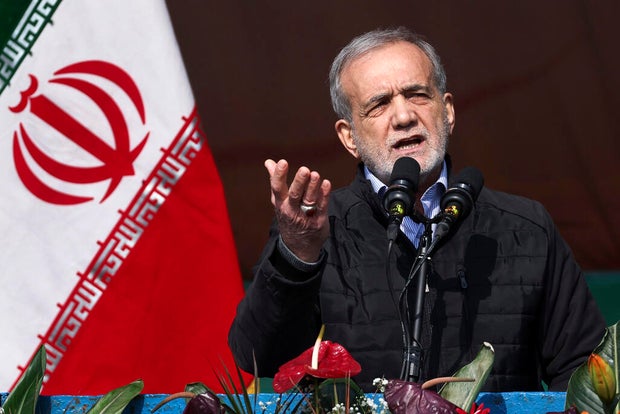The Iranian president said Tehran rejected direct negotiations with the United States after Trump’s letter.

Iranian President Masoud Pezeshkian said on Sunday that the Islamic Republic refuses to respond with direct negotiations with the United States A letter from President Trump earlier this month on the country’s rapidly developing nuclear program. This is Tehran’s first official response to Mr. Trump’s letter.
“Although the possibility of direct negotiations was rejected in this response between the two sides, it was stressed that the path to indirect negotiations remained open,” Pezshkian said.
Iranian Presidential Office via AP
However, it is not clear whether Mr. Trump will accept indirect negotiations. Indirect negotiations have not been successful since Trump initially withdrawn from the United States from Tehran’s nuclear deal with world powers in 2018.
The White House did not respond immediately to the announcement.
In an interview with Fox Business News earlier this month, Mr. Trump revealed that he had sent a letter to Iran’s supreme leader Ayatollah Ali Khamenei, urging him to negotiate and warn of potential military operations if refused.
“I would rather negotiate a deal. I’m not sure everyone agrees with me, but we can make a deal as good as you,” Trump said. “But it’s time. The time is up. Some things will happen one way or another. I want Iran – I wrote him a letter saying, ‘I hope you’re negotiating.’ Because if we have to go in the military, it’s going to be a horrible thing – for them.”
On Sunday, ahead of Pezeshkian’s comments, in an interview with NBC News, Mr. Trump reiterated that he was considering military operations and secondary tariffs if Iran did not agree to the nuclear deal.
“If they don’t reach a deal, it will explode, and it will bomb such a person they’ve never seen before,” he said.
Mr. Trump’s proposal comes as both Israel and the United States warn that they will never allow Iran to obtain nuclear weapons, leading to fears that Tehran is enriched at a near-weapon level, which can only be accomplished by atomic armed states.
Iran has long stuck with its plan for peaceful purposes, even as its officials increasingly threaten the bombs as tensions over U.S. sanctions against it are high and after Israel’s ceasefire collapses War against Hamas in the Gaza Strip.
The risks of military operations against Iran’s nuclear program remain when the U.S. launches strong air strikes on Iran-backed Houthi rebels in Yemen.
A report from the UN nuclear regulator last month said Iran “significantly increased production and accumulation of highly enriched uranium.”
Last week, Khamenei Warn the United States of threats to his country “There will be nowhere to go,” he added, “Americans” and others should know that if they do anything malicious to the Iranian nation, they will get a slap. ”
He has had it before Dismissed Mr. Trump’s proposal During the negotiations, the U.S. president was accused of trying to deceive global public opinion by portraying the U.S. willing to negotiate and Iran is unwilling to participate.
Mr. Trump’s first term during his tenure was particularly difficult relationships with Tehran. In 2018, he unilaterally withdrew from Iran’s nuclear deal with world powers, resulting in sanctions on Iran’s economy. Iran has retaliated against the attacks at sea – including possible attacks and temporarily cut Saudi Arabia’s oil production in half.
Trump also ordered the killing of Iran’s highest general in a Baghdad drone strike in January 2020.


